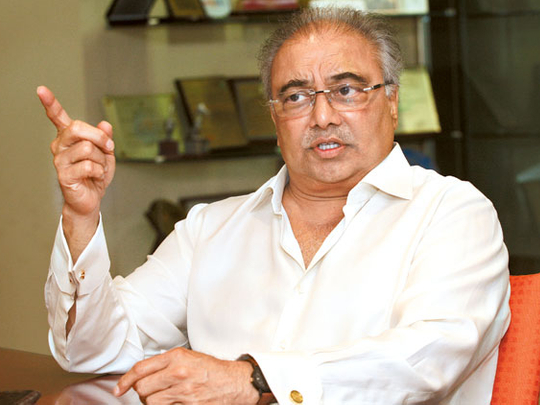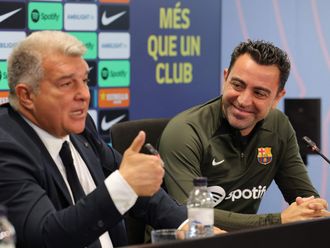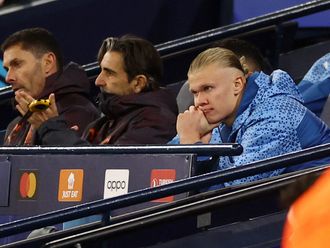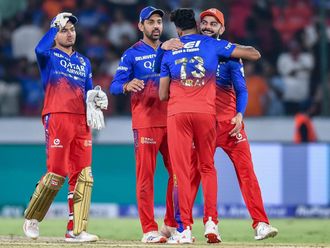
Dubai: Rajen Kilachand, whose company Dodsal Group owns the Indian second-tier side Mumbai Tigers FC, has confirmed his intention to bid for a slot in the I-League at next month’s All India Football Federation (AIFF) auction.
Two positions in the 14-team first division I-League have been left vacant by state-owned clubs Air India and Oil and Natural Gas Corporation (ONGC) after Asian Football Confederation (AFC) criteria ruled clubs must become commercially viable private entities.
Speaking to Gulf News in his company headquarters in Dubai, Kilachand spelt out his future plans about a game he is extremely passionate about.
Now set to invest around $36.8 million (Dh135 million) for The Tigers to have a guaranteed five-year stay in India’s top flight, Kilachand must – in exchange – build a stadium and an academy to help develop India’s sporting infrastructure. That’s something Kilachand believes is worthwhile and long overdue, especially with the country supposedly on the verge of a footballing revolution. Along with Emirati club CEO Mohammad Omar, a UAE Gulf Cup and Al Ain Asian Champions League winner, the duo are plotting Asian dominance by 2017 and had reportedly been in discussion to sign big names such as former Manchester United and Arsenal defender Mikael Silvestre, something they now deny.
Q. Are you bidding for a slot in the I-League?
A. Yes. If we don’t finish in the top two this season, we would have to wait a whole year for promotion. But if accepted, we don’t have to go through this process. We’ll give it our best shot and see what happens.
Q. What’s the potential for Indian football?
A. Tremendous. How can you call football a world sport when a population of 1.2 billion and counting, of which 60 per cent is under the age of 32, is ignored? Sport until the 1950s was the preserve of royal families. Due to cost, it was managed by the British Army and then the public sector. It all got relegated under the post-independent era, kept alive only by the poor people in the slums. Opposite to China, we had political democracy but economically it was a peculiar blend of free-market socialism. But after the 1990s awakening with the opening up of the economy, cricket took off and sport’s modernisation began. The time for football has come and with today’s globalisation, it will go from zero to world class in a much shorter time than before.
Q. Are you in it for the money?
A. I don’t look upon it as business. I’ve had my fun in business for the past 45 years. This is my passion. If I wanted to make money, the last thing I would do is invest in a sports team. But football is now being broadcast on TV more and more, and with sponsorship from consumer brands, it will become profitable. The initial capital is pretty heavy and there are substantial running costs, but if it follows the way of cricket, a reasonable team won’t have trouble finding sponsors to cover the costs.
Q. What’s the priority should your bid be successful?
A. Conditions of the bidding process require us to build a stadium and an academy. Before the end of the year, we will buy land in New Mumbai and build world-class facilities, with nutritionists, dormitories and an integrated training facility. Parents are now seriously looking at allowing their children to have a career in this because they can make a very handsome salary.
Q. Will you buy big names to attract sponsors, such as Mikael Silvestre?
A. We never asked him, this is a figment of his imagination. We don’t need big names, we need good players. If the name happens to be big, then fine. But frankly I’m appalled at so-called big names, who are good players, but I think it’s haywire the amount of money these guys are paid and you can’t tell me that they are the only party in town. My personal philosophy is to combine players from Africa, the GCC and India, because the next 1,000 years of the planet belong to everything in this part of the world – the party in the West is over. The future Beckhams are all going to be here and the future is not 20 years from now but two years down the road. Why has Fifa gone out of its way to bring India into the fold? Because they know the future.
Q. What’s the target for Mumbai Tigers?
A. To be number one in Asia within four years, that’s our objective. If you don’t shoot for the stars, you’re not even going to take-off. Anything is achievable. In one year we’ve gone from not existing to Durand Cup runners-up and [in the] top two in the I-League second division.











